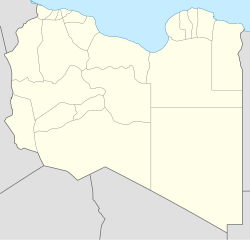Bi'r al Ashhab بئر الأشهب | |
|---|---|
Village | |
 | |
| Coordinates: 31°55′00″N24°42′00″E / 31.91667°N 24.70000°E | |
| Country | |
| Region | Cyrenaica |
| District | Butnan |
| Population (2006) [1] | |
• Total | 6,399 |
| Time zone | UTC+2 (EET) |
Bi'r al Ashhab is a small village located at Cyrenaica in eastern Libya. It is located about 69 kilometres south-east of the capital of the Butnan District - Tobruk. [2]
